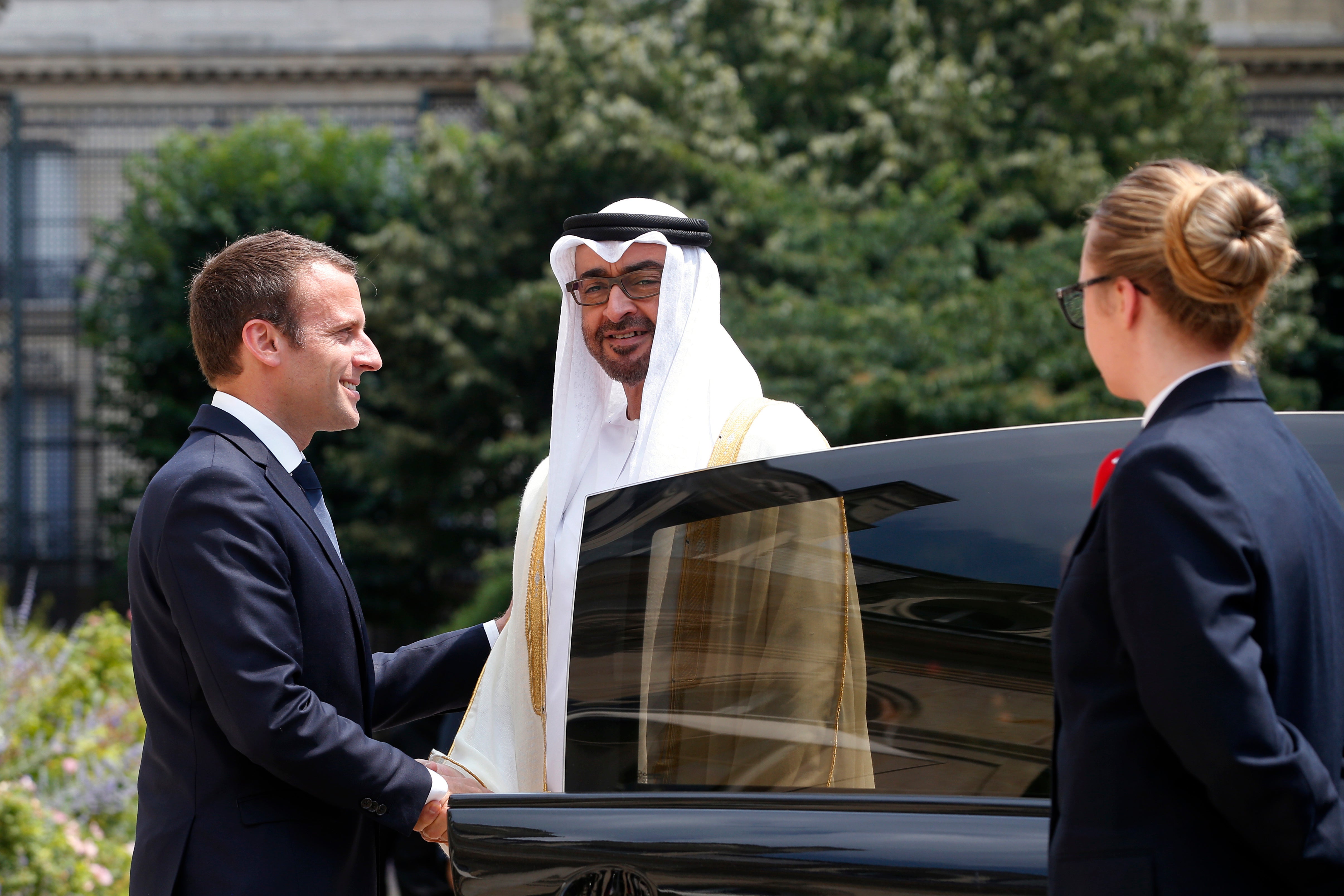Macron visits Gulf seeking arms deal, stronger regional role
French President Emmanuel Macron is visiting the energy-rich Persian Gulf, hoping to seal a major arms sale after the fall’s Australian submarine deal debacle and to strengthen France’s regional role

Your support helps us to tell the story
From reproductive rights to climate change to Big Tech, The Independent is on the ground when the story is developing. Whether it's investigating the financials of Elon Musk's pro-Trump PAC or producing our latest documentary, 'The A Word', which shines a light on the American women fighting for reproductive rights, we know how important it is to parse out the facts from the messaging.
At such a critical moment in US history, we need reporters on the ground. Your donation allows us to keep sending journalists to speak to both sides of the story.
The Independent is trusted by Americans across the entire political spectrum. And unlike many other quality news outlets, we choose not to lock Americans out of our reporting and analysis with paywalls. We believe quality journalism should be available to everyone, paid for by those who can afford it.
Your support makes all the difference.French President Emmanuel Macron is visiting the energy-rich Persian Gulf Friday, hoping to seal a major arms contract after this fall's Australian submarine deal debacle and to strengthen France’s role in the region.
The two-day visit to the United Arab Emirates, Qatar and Saudi Arabia comes a month before France assumes the rotating European Union presidency — and ahead of the French 2022 presidential election where Macron is expected to seek a second term.
Returning from the Gulf with a contract to sell French fighter jets to the Emiratis, a deal that Paris and Abu Dhabi have discussed for almost a decade, would boost France’s defense industry after the collapse of a $66 billion contract for Australia to buy 12 French submarines.
And the red carpet treatment Macron can expect from Gulf political heavyweights would present France as the EU powerhouse in the Gulf and Middle East since Britain’s exit from the bloc.
“Macron stands out among European Union leaders with his willingness to be in the spotlight, to drive the foreign policy and push things ahead,” said Silvia Colombo, an expert on EU-Gulf relations at the International Affairs Institute in Rome.
But, primarily, Macron is pursuing French business interests, Colombo said. “He has a very clear idea that he has to go where the business community wants to be, where France can make economic gains.”
Macron’s keen interest in forging personal relationships with leaders like Mohamed bin Zayed Al Nahyan, the crown prince of Abu Dhabi, and his counterpart in Saudi Arabia, Mohamed bin Salman Al Saud, makes him a welcome guest. Both Gulf leaders value a degree of pragmatism when discussing democracy and human rights – issues on which their countries have been heavy criticized by rights groups and European lawmakers — while pursuing business opportunities.
France has deep ties to the United Arab Emirates, a federation of seven sheikdoms on the Arabian Peninsula, particularly since the Sept. 11, 2001 attacks. The UAE opened a French naval base in 2009 at Abu Dhabi’s Port Zayed. French warplanes and personnel are also stationed at Al-Dhafra Air Base, a major facility outside the Emirati capital of Abu Dhabi that’s also home to several thousand American troops.
Months after Macron was elected in 2017, he traveled to the UAE to inaugurate Louvre Abu Dhabi, built under a $1.2 billion agreement to share the name and art of the world-famous museum in Paris.
In September, Macron hosted Abu Dhabi's crown prince at the historic Chateau de Fontainebleau outside Paris, which was restored in 2019 with a UAE donation of 10 million euros ($11.3 million).
The UAE and France have also become increasingly aligned over a shared mistrust of Islamist political parties across the Middle East, and backed the same side in Libya's civil strife.
A senior French presidency official who spoke to reporters ahead of the trip on customary condition of anonymity said Macron will “continue to push and support the efforts that contribute to the stability of the region, from the Mediterranean to the Gulf.”
Gulf tensions will be discussed, the official said, in particular the revived talks about Iran’s nuclear deal with world powers, following the U.S. withdrawal from the agreement by President Donald Trump. Gulf countries have long been concerned by Iran’s nuclear ambitions and influence across the region, particularly in Iraq, Syria and Lebanon.
“This is a hot topic,” the French official said, adding that Macron discussed the issues in a phone call Monday with Iran's president. He will talk about the call and the issues — including the nuclear deal talks in Vienna — with Gulf leaders, who are “directly concerned by this subject, like all of us but also because they are (Iran’s) neighbors,” the official said.
France, along with Germany and the U.K., thinks the 2015 nuclear agreement — with minor tweaks — is the way forward with Iran, analysts say. The UAE and Saudi Arabia have bitterly opposed the West’s negotiated deal with Iran.
“Although the Gulf countries did not like the West’s deal with Iran, the prospect of it falling apart acrimoniously is also bad for them and arguably presents worse risks,” said Jane Kinninmont, a London-based Gulf expert with the European Leadership Network think-tank.
“Their view has always been the West should have gotten more out of Iran before sealing the deal,” Kinninmont said. “But if the West walks away with nothing, the Gulf countries are beginning to understand that their security will not improve as a result.”